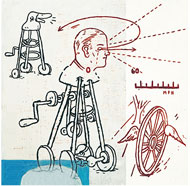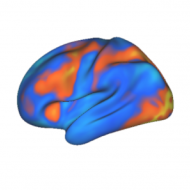 Freedom to choose is the first axiom of our being. We assume freedom with each action that we take, and we are annoyed when we are forced to act "against our will". A recent article on free will at the New York Times explains that determinism is a direct implication of the brain being the seat of the mind in conjunction with Newtonian physics (also see the recent Mind Hacks post). Why, then, do we assume at each moment that we have free will? How is it that someone could use force and coercion to take away a freedom that we never had to begin with?
Freedom to choose is the first axiom of our being. We assume freedom with each action that we take, and we are annoyed when we are forced to act "against our will". A recent article on free will at the New York Times explains that determinism is a direct implication of the brain being the seat of the mind in conjunction with Newtonian physics (also see the recent Mind Hacks post). Why, then, do we assume at each moment that we have free will? How is it that someone could use force and coercion to take away a freedom that we never had to begin with?
An increasingly common argument against determinism is based in quantum physics. Certainly Newtonian physics (where every cause must have a pre-determined effect) implies determinism, the argument goes, but quantum physics allows for some 'wiggle room'. Such wiggling takes place at the subatomic level in the form of random movements, such that events in the world supposedly have a base of random chance behind them.
I actually find quantum physics to be a negative for free will: I would rather have a predictable and determined will than one that was based on a series of coin flips. At least a determined will allows for the maintenance of a self that can choose (even if the same decision is made every time).
But why don't we make the same decision every time? Because we have memory.
Memory is the key to the kind of free will we want. Why is it that my freedom is taken from me when I am held at gun point? What freedom is there to take away? The freedom of my self to choose among the present alternatives is taken away out of fear of a negative outcome. (Note that one's self is a form of long term memory; just look at those who have forgotten themselves in advanced Alzheimer's disease).
What alternatives? If the world is determined then there are none. Ah, but our brains have causal powers, just like any other object in the world. Because of memory (of ourselves and past events) our brains obtain unique causal powers in the world, and thus we can make unique and free contributions to the world.
It is true that our experiences are determined, and thus our memories are determined. Ultimately everything is determined, and if that bothers you then you just have to get over it. What you can hold onto, though, is your uniqueness in the world, and your ability to choose based on your unique past experiences. You provide a unique causal source in the world, and you are obligated to act in order to unfold those (pre-determined but often unpredictable) unique actions into the world. This is what we mean when we say we have selves and wills, and our ability to have and act upon desires constitutes freedom of those selves and wills.
Why is it that you don't always make the same decision the next time you're in a similar situation? Among your past experiences are your past choices. So, your current choices can be influenced by your past choices, such that you might decide to 'mix things up' a bit by choosing differently. How more free can you get?
When an event in the distant past can influence your will in a meaningful way right now, then that is something amazing that can't be taken for granted. We can take our experiences with us, we can take our unique interpretations of those experiences with us, and we can use what we take with us to decide what to do next. Learning and memory, then, underly our freedom of will.
-MC

Leave a comment